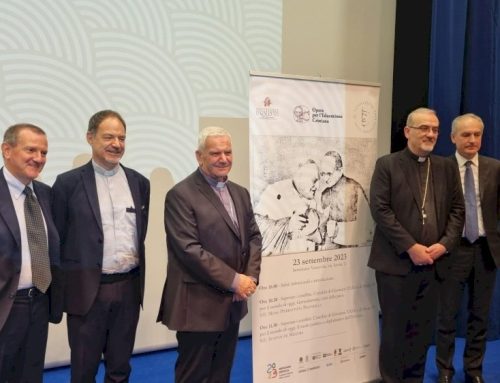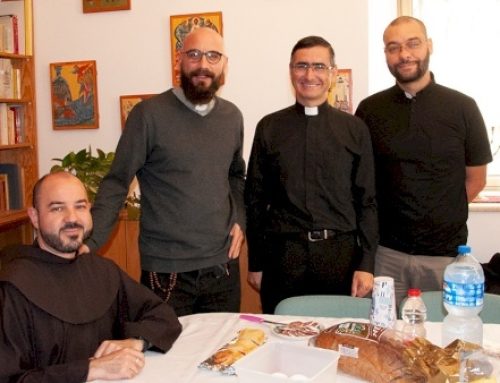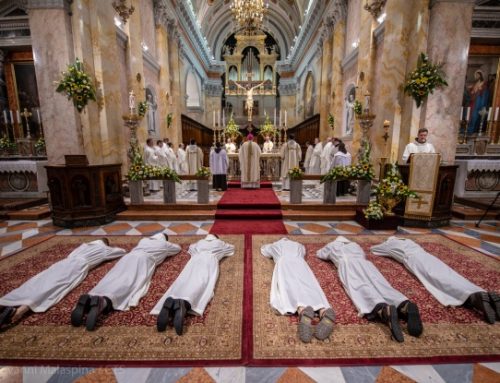“American Christians have little or no knowledge of the plight of Palestinian Christians… “We are asking the American public to find the truth and make their own judgment. If American Christians found out the truth, they would do what is right.”
Palestinian Christians, facing economic hard-ships, housing shortages and lack of adequate education, are leaving the Holy Land at such an alarming rate that, soon there may not be a Christian presence in the land where Jesus Christ lived, warned participants at a conference on Saturday.
About 300 people gathered at Stone Ridge School of the Sacred Heart in Bethesda for a conference designed to “increase the awareness of American Christians to the plight of Palestinian Christians, and to make Americans aware of the conditions the Palestinians live under,” according to Rateb Rabie, one of the organizers of the event The first national conference for Christians and their Churches focused on “Endangered People: Christians in the Holy Land, Can They Survive the Millennium?” It was sponsored by the Holy Land Christian Ecumenical Foundation (HCEF) under the auspices of Patriarch Michel Sabbah, the Roman Catholic patriarch of Jerusalem.
The conference outlined economic hardships faced by-Palestinian Christians forcing them to leave their home-land: the lack of decent housing, Israeli government confiscation and demolition of Palestinian homes and other properties, inadequate educational opportunities, no housing and economic development plans, poor job opportunities and political oppression. Rabie, a Catholic, is president of Image Printing and Publishing, Inc. and Vision Management and Consulting, Inc. He is cofounder and President of the Holy Land Christian Ecumenical Foundation (HCEF). He was born in Amman, Jordan, and his family is originally from Birzeit, near Jerusalem.
American Christians have little or no knowledge of the plight of Palestinian Christians, Rabie complained. “The media here only covers war between Arabs and Israelis,” he said. “We are asking the American public to find the truth and make their own judgment. If American Christians found out the truth, they would do what is right.”. Rabie stressed that American Christians making a Holy Year pilgrimage to Christendom’s holiest sites should make an effort to meet with Palestinian Christians and learn of their plight.
“There is, something more to the Holy Land that is beyond, say, the Church of the Nativity or the Basilica of the Holy Sepulchre. If things continue the way they are, and the Palestinian Christians continue to leave, then these churches will become empty museums, just a collection of dead stones,” Rabie said.
“It is the duty of every Christian in the world to keep and increase the Christian presence in the Holy Land. Palestinian Christians are the ‘living stones’ of the faith” he added.
Because of the exodus of Palestinian Christians from the Holy Land, the Washington-based HCEF was established to highlight the plight of Palestinian Christians and to raise money and awareness of their situation. Rabie said the HCEF is committed to improving the lives of Christians in the Holy Land by developing bonds of solidarity between them and Christians in the United States.
Joining Rabie in establishing the foundation was Father Emil Salayta, general director of the educational department of the Latin Patriarchate of Jerusalem.
HCEF statistics paint a dire picture of the Christian presence in the Holy Land.
– In 1948, Christians comprised about 18% of the population of the Holy Land, today they account for less than 2%.
– The population decline in Jerusalem has been even more dramatic.
– In 1922, Christians numbered 51% of the population in Jerusalem; in 1978, Christians accounted for 10% of the city’s population and in 1990, only 4% of the population were Christian.
– Lebanon has the highest percentage of Christians among its population, but in terms of numbers Egypt has the most Christians with about 20 million.
According to Father Salayta there is only about 16,000 total Christians in Palestine. He said that the largest Christian group belongs to the Greek Orthodox Church The Diocese of Jerusalem, which includes all of Israel, Jordan and the Palestinian areas has about 60,000 Catholics.
– In addition to serving as director of the Latin Patriarchate of Jerusalem’s educational department, Father Salayta, a native of Madaba, Jordan, is also pastor of Immaculate Conception Parish in Birzeit and general secretary of the Priest’s Council of the Latin Patriarchate.
The priest also stressed that the plight of Palestinian Christians should be known.
“We need to raise awareness of Palestinian Christians.” Father Salayta said. “Most American Christians would be astonished to know that I am an Arab and a Christian and a priest.”
Palestinian Christians feel “ignored and forgotten,” he said, “and maybe part of the problem is we did not make ourselves known.
Arab Christians are not converted from Islam. We. are original Christians from the first Christian era.”
Rabie said that Palestinian Christians “feel hurt” by the western Church’s apparent lack of interest in their welfare. “Christians come to the Holy Land, usually on Israeli (Ministry of Tourism) sponsored trips, so really they are vacations, not pilgrimages,” Rabie said. “Western Christians come to the Holy Land and have nothing to do with us, their brothers and sisters in faith.”
‘When western Christians meet Christians living in the Holy Land, he added, “they will learn that we are the original Christians, we’ve been there since the Birth of Our Lord Jesus Christ”.
Noting the strong ties between Palestinian Christians and Palestinian Muslims Father Salayta said, “We are Christians but we share the same history, the same aspirations, the same blood and the same pain as our Palestinian Muslim brothers.”
The priest added that Palestinian Muslims “`feel that we Christians are part of the Palestinian family,” and that many Christians are active in and hold important posts in the Palestine Liberation Organization.
Pointing to Pope John Paul II’s Jubilee Year trip to the Holy Land next March, Rabie said that “his visit is a good thing, because it will shed light on the problems of Palestinian Christians.”
The Pope has always asked for a shared Jerusalem and for freedom, justice and respect for Palestinian Christians, ‘the forgotten faithful’ he said.
The HCEF, Rabie said, was founded earlier this year and is comprised of a group of “good American Christians who want to help Palestinian Christians.” The foundation seeks to provide “schools, good living conditions, and peace”, so that Palestinian Christians do not leave to the Holy Land, he added.
“Collecting money is important, and we hope our American Christian brothers and sisters would respond to our plea,” Rabie said. “But just as important is for our American brothers and sisters to help us with a lasting and just peace.”
The HCEF seeks to raise money for programs that will encourage and assist Christians to remain in the Holy Land. Its goals are to educate Americans about the plight of Palestinian Christians, develop church-to-church, family-to-family and person-to-person partnership programs and to finance employment, educational and housing projects for Christians in the Holy Land.
“The American people are open hearted once they know about the living conditions of many Palestinian Christians,” Father Salayta said, “The Holy Land is where we live, but every Christian in the world should feel that they belong to the Holy Land.”
“We have to figure out practical steps of solidarity,” the priest said. “We are at the critical stage where many Palestinians are emigrating to the west.”
Saturday’s conference was one of several recent programs to highlight the needs of Palestinian Christians.
On Monday, Father Majdi Siryani, the legal advisor to the Latin Patriarchate in Jerusalem, and Bishop Mounib A. Younan of the Evangelical Lutheran Church in Jordan, presented a briefing in the U.S. Senate’s Dirksen building on the problems facing Palestinian Christians living in Jerusalem.
The presentation was jointly sponsored by the HCEF. Evangelicals for Middle East Understanding (EMEU), and the American Committee on Jerusalem (ACJ). Bishop Younan and Father Siryani offered Evangelical and Catholic positions on the status of Jerusalem, as well as discussing the conditions leading to Christian emigration from Jerusalem and the Holy Land.
Palestine encompasses the region be between the Jordan River and the Mediterranean Sea. In 1947, most of the territory became the state of Israel when the United Nations ratified a partition plan. The state of Israel was proclaimed on May 14, 1948.
From the time Israel was proclaimed a nation in 1948 until the 1967 Arab-Israeli War, Jerusalem was a divided city. East Jerusalem, including the Old City, was under Jordanian rule, and west Jerusalem was controlled by Israel. During the war, Israel captured the city and it has been under Israeli control since then.
In addition to Jerusalem, Israel also captured areas of biblical Judea and Samaria, including the towns of Shechem, Shiloh, Bethel, Bethlehem and Hebron.
On Nov 15, 1988, the legislative body of the Palestine Liberation Organization declared Palestine an independent state and voted to accept UN resolutions that recognized Israel’s right to exist. Israel at first refused to deal with the PLO, but in 1993 Israel agreed to recognize the PLO and grant limited self-rule in the Gaza Strip and Jericho. The pact was signed in Washington on Sept. 13, 1933. In September 1995 Israel signed an agreement transferring control of much of the occupied West Bank to the Palestinian Authority.
The Vatican formally recognized Israel after each of the two sides’ in the conflict recognized the existence of the other. The Vatican has also stressed that Palestinians have the right to sovereignty over their land, and to freedom and self-determination.
(Persons interested in contacting the Holy Land Christian Ecumenical Foundation can write to P.O. Box 6687, Silver Spring, MD, 20906, or they can call 301-871-9222.)



